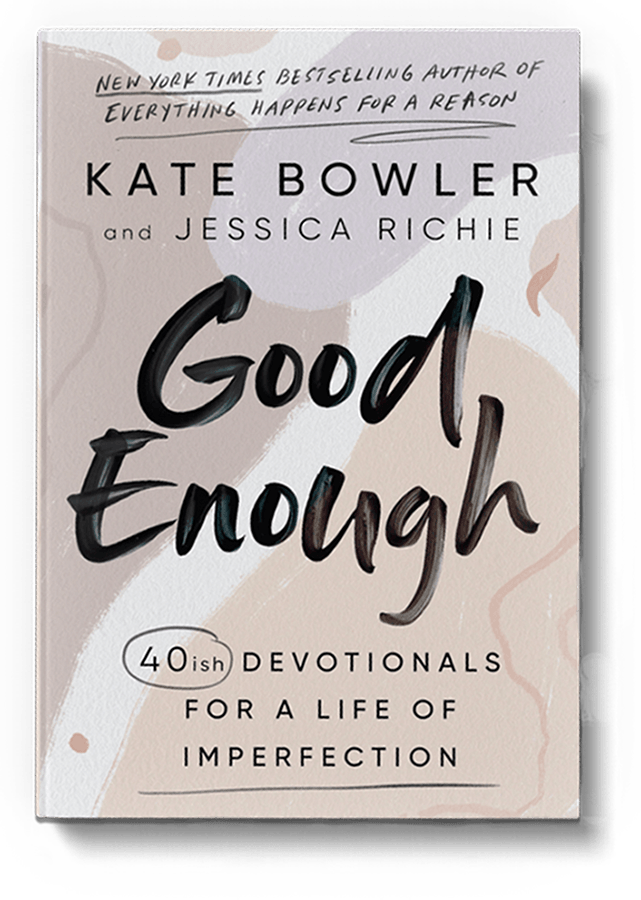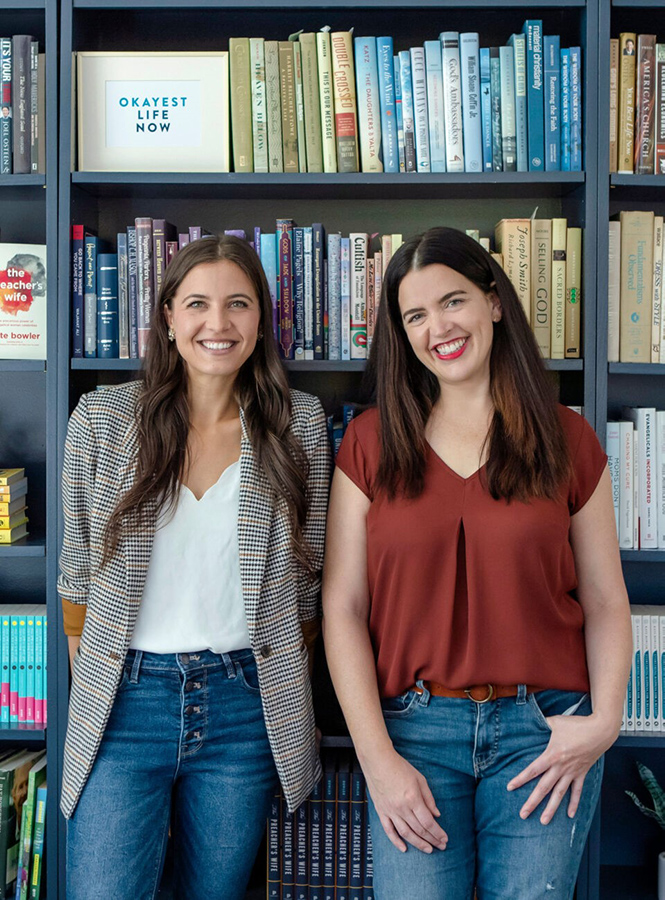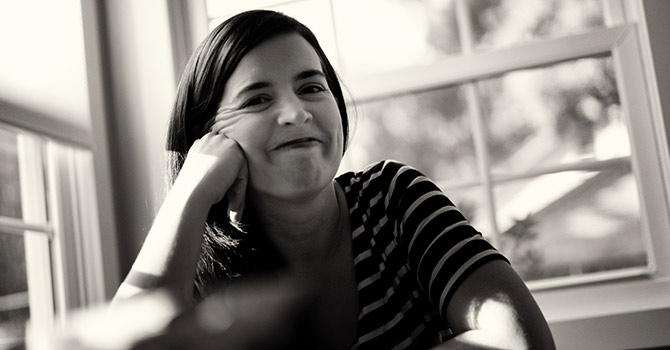It helps that Kate Bowler and Jessica Richie work well together.
In conversation, they anticipate each other’s stories. In writing, they create from a shared document. And in their first book together, “Good Enough: 40ish Devotionals for a Life of Imperfection,” they offer a collection of meditations that are wise, sometimes whimsical and always grounded in reckoning with crushing expectations of accomplishment.

Bowler is an associate professor at Duke Divinity School and a New York Times bestselling author who documented her experience as a young mother with stage 4 colon cancer in “Everything Happens for a Reason: And Other Lies I’ve Loved.” In September, she published “No Cure for Being Human (And Other Truths I Need to Hear).”
Richie is executive director of the Everything Happens Initiative and executive producer of the “Everything Happens” podcast — projects sparked by the overwhelming response to Bowler’s challenge of the notion that human suffering is God’s punishment or the result of the wrong kind of faith.
In the recently released “Good Enough,” the colleagues and friends provide individual reflections along with a prayer and a “good enough step” for each that could serve as a walk through Lent or a pause in any moment that needs a reset from worldly expectations.
They write: “Perfection is impossible, but transformation isn’t. We can change a bit, if we really want to.
“This is the choice embedded in every day from the moment we wake up. We will have to find enough momentum to reach for a faith that is never perfect, but good enough.”
Bowler and Richie spoke with Faith & Leadership’s Aleta Payne ahead of their book’s release. The following is an edited transcript.
Faith & Leadership: I remember a reference to the pandemic perhaps only once in the book, but to me the devotionals speak to this place that many of us are in right now. Would “Good Enough” have happened if not for this season?
Kate Bowler: I think it was a question I had first around my cancer diagnosis and whether it would be terribly relatable for people to see someone as having a devastating diagnosis, whether the experience of cancer has much to say about anything else.
I think the collective experience of the pandemic — and this is something we say over and over again in the podcast — is that life is a chronic condition. And so, what now?
One of the things we talk a lot about is whether we can get much better, whether we can improve all that much. I think one of the big pandemic questions is, what, if anything, can help? What truths can help us live here like this without a progress narrative?
That’s been part of the evolution of the project from a kind of cancer focus to the broader questions of precarity and fear and everydayness of our problems.
It just seemed like one thing that completely hit home for us and for everyone else — that the illusion of progress is gone.
Yet we as Christians believe that we still need to be transformed by God’s love and in God’s community.
And both of those feel really hard when our resources are dwindling and our understanding of community has frayed. It felt like an opportunity for us to re-up, sort of fill up our own batteries with the truth of questions we care about.
We ask all the time, “What can we really promise people?” We did that today. We were just launching our eighth season of the podcast. We were talking to Katie Couric, and it was a beautiful conversation about grief and the incompleteness of it.
She felt she couldn’t be honest about the death of her first husband while he was dying. Jess wrote a beautiful blessing. And then we sat around just saying, “What true thing will always be true today and tomorrow?” I don’t think we would’ve done that if it wasn’t a war of attrition right now.
Jessica Richie: Just practically, the idea of making something like this was born during the pandemic. And I think it was because Kate and I both needed to pour our energy and time into just making something when our lives felt really small and disconnected and scary. There’s something really beautiful about pouring yourself into meaningful work when so much is out of your control.
We’re such hustlers — that’s also why the burden of hustle is a question that we are always kind of testing the weight of. When is there too much action? When is there not enough? What pushes us into service and joy? What depletes us?
Perfectibility and “good enough” are things that we openly wrestle with and love to think about. But good enough has now become such a fun slogan for us. There’s a lot of, “Well, good enough.” We say good enough about everything now. We hand over something that’s only medium done — “It’s good enough for today.”
F&L: Among my favorite quotes in the book is “Thank God we are a group project.” Again, this moment feels as though we have been so pulled apart, but would you speak to some of the important lessons you see in self-made versus community-made?
KB: The pandemic is an exercise of failed individualism, right? This is the brinkmanship of our moment. We all pretend we could do it alone, but worse than that, at one another’s expense. And I think we’re seeing a reckoning with the limits of these gospels of individualism, the selfishness of that paradigm in which we fault anyone who can’t do it alone.
We create all kinds of hierarchies that explain why some lives are worth more than others. And then we declare some winners and losers. A collective health crisis has meant that it became incoherent as a cultural framework, and yet we persevered with our gospels of individualism.
It feels like the right time to say we were never made to do this alone. The idea that we belong to one another is one of the most radical things we can say, that we ought to be broken open by one another’s pain. Even just living for yourself is a lie. My germs are not just my germs now, are they? And so my burdens should not be just my burdens. Neither should others’.
One of the first, hardest lessons I learned when I got sick was that I actually wasn’t able to do it alone. And I felt a tremendous amount of embarrassment about not being able to perfect my own life, but one of the most beautiful and most awful things I learned was that when you can see fragility in your own life, you’ll be able to see it in everyone else’s. And then it will spark in you some kind of knowledge that we are the plan.
We have a community that we get to serve directly and that also helps inspire us to care, to sort of solve the narcissism of pain with some kind of service. That has also felt like a huge privilege in this season. There’s so much loneliness, but I don’t feel alone, because I can see the webs between us. And also you get the feeling of everybody’s heartbeat on this, everybody’s loneliness. That’s a burden and a joy.
JR: I still am bad at remembering that I’m a group project. I would much rather do everything by myself, thank you so much. But Kate, you are always so forceful in your lessons that remind me that I could do it alone but I shouldn’t have to. So I’m a recipient of that care from you.
F&L: You talk about blessing the people we don’t like. Do you have any tips for that?
KB: This is not an easy season to love our neighbor. It is not.
Our neighbor isn’t just annoying. Our neighbor endangers us. Our neighbor questions our humanity. Our neighbor doesn’t want to carry us. It is a hard time to love our neighbor.
Every tool we use to connect is also working against us. Our algorithms are working against us. Our isolation is working against us. Our self-selected communities are creating such intense echo chambers that it would be very hard to even recognize other people’s voices. I just think, in our moment in history, it will be entirely uphill to create a vision of a bigger version of love right now.
I am more tempted to like only the weak, the gentle. You know what I mean? We see the underdogs so much, and I’m tempted to love only them: “That would be God’s preference.” I have felt God’s presence most in times of pain and weakness and fragility, my own and others’. So I do see that.
Where I need to be stretched is in having a more natural compassion for people who feel like they have it all, seem like they have it all together. People who vote and speak in ways that I don’t understand. So I think this will not be a time of natural grace. I think we have to pray for supernatural opportunities and also good policies that help — that give us greater reasons to be on each other’s team. This is not a time of natural grace.
JR: I’m thinking about two conversations from the podcast, Kate, that were so challenging on this topic. The first was when you talked to Christie Watson, who’s a nurse in the U.K. She was a professor of nursing, and she then went back to nurse on the front lines during the initial COVID epidemic. She described the way she knew that she was doing her job right: that caring was going to cost something. And the gift of a nurse, of anyone in a caring profession, is learning to love the stranger.
That echoed again when you talked to Sarah Sentilles, who’s this gorgeous writer who was fostering-to-adopt a little baby girl named Coco. At first she thought the stranger was this gorgeous, teeny-tiny infant, but that love felt very easy for her.
She had to actually learn how to love the stranger, who was Coco’s biological mother. She had to stay in this relationship when she didn’t agree with all of the mother’s choices, which actually were putting the baby at risk in so many ways.
That theme has come up again and again. It’s not just to tolerate strangers but to love them. And then even to bless them. And what does that cost us? And might we know we’re doing it right if it actually hurts to sacrifice something of ourselves, too? Maybe that’s love.
KB: There’s that one line in the Christie Watson interview about the cost of caring. We talk about it in the book:
What will good things cost us?
Hope costs us the satisfaction of cynicism.
Love costs us selfishness.
Charity costs us greed. Which is fun, let us be clear.
And then our narratives of self-care are not the counter to that. We don’t actually fill up our own batteries and then we’re going to have a natural, uncostly love for one another. I think this is the great cosmic group project, that God will have to be the webbing between us at this point. Because the other plan is just that I’m a really good person. Right? I think that’s most people’s plan: “Well, I’m a pretty good person; I’ll do OK.”
JR: Taking enough bubble baths, somehow, and naps. Naps will certainly fix us up.
F&L: You both speak consistently throughout the book about being honest with your feelings, being honest with yourself, not having to hide the things you’re going through. I think about the caretakers and the caregivers and especially about clergy, whom I really want to have it together and be rock-solid. How does this work for those folks? How can we create an honest space for them?
KB: We have two kinds of primary readers for the book: those the podcast reflects the direct experiences of and then those who love them. And those who love them often have not received that message. That this is their story, too. These are their burdens, too.
So often we see people whose love, whose dependence, whose caretaking has created a lot of deferred hopes. They had a life they were going to lead. They might have a trip they wanted to take. But their plotline has been eclipsed by a different plotline, which is one born of love for a kid or an elderly parent or a congregation or a set of clients for social workers.
And I think one thing we would want to say at the same time is that their vocation is a gift. There’s such beauty and dignity in the call on their lives. But also that that doesn’t mean that it has not also cost them and that they aren’t allowed to experience peace and rest. They’re allowed to turn down the volume of that frenetic feeling of needing to professionally care all the time in order to tend to their own peace and souls.
Sometimes it’s even just convincing the caregivers that they’re not solely defined by their vocation, however beautiful. And that they might have a chance to recover some of the plotlines of their own lives. I think that’s partly why we talk a lot about joy and absurdity and just the stupidity of small things. The volume on the pain of the world can sometimes prevent us from feeling. Our joys, or even our personalities, can be equally loud.
So I think about a recovery of quirkiness and whimsy and stupidity and wastefulness, really gorgeous wastefulness, a lot, which so many people can’t afford in their lives.
I think that’s why we always refer to Gary Haugen, who runs International Justice Mission. He’s running an organization of [hundreds of] lawyers working to eradicate human slavery. Who’s going to tell that guy he’s allowed a break?
I’ve seen the organization; they so carefully structure in meditation, rest, spiritual rest and delight. And I learned from that that there’s something about our joy that gives God joy and allows us to cut through the noise.
That all falls under the umbrella of dignity, the dignity of our calling. But also the permission to not have such an overdeveloped sense of vocation that we forget all the other aspects of our humanity.





















